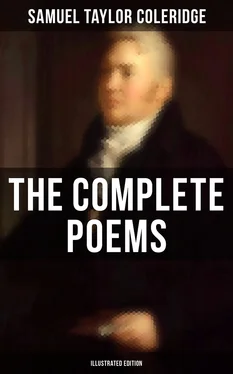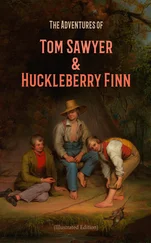This I wrote on Friday morning, forty minutes past three o'clock, the sky covered with one cloud that yet lies in dark and light shades, and though one smooth cloud, by the dark colour, it appears to be steppy .
A DREAM AND A PARENTHESIS Friday morning, 5 o'clock
Dozing, dreamt of Hartley as at his christening—how, as he was asked who redeemed him, and was to say, "God the Son," he went on humming and hawing in one hum and haw (like a boy who knows a thing and will not make the effort to recollect) so as to irritate me greatly. Awakening gradually, I was able completely to detect that it was the ticking of my watch, which lay in the pen-place in my desk, on the round table close by my ear, and which, in the diseased state of my nerves, had fretted on my ears. I caught the fact while Hartley's face and moving lips were yet before my eyes, and his hum and haw and the ticking of the watch were each the other, as often happens in the passing off of sleep—that curious modification of ideas by each other which is the element of bulls . I arose instantly and wrote it down. It is now ten minutes past five.
To return to the question of evil—woe to the man to whom it is an uninteresting question, though many a mind over-wearied by it may shun it with dread. And here—N.B.—scourge with deserved and lofty scorn those critics who laugh at the discussion of old questions: God, right and wrong, necessity and arbitrement, evil, &c. No! forsooth, the question must be new, spicy hot gingerbread, from a French constitution to a balloon, change of ministry, or, Which had the best of it in the parliamentary duel, Wyndham or Sheridan? or, at the best, a chymical thing [or] whether the new celestial bodies shall be called planets or asteroids—something new [it must be], something out of themselves—for whatever is in them is deep within them—must be old as elementary nature [but] to find no contradiction in the union of old and novel—to contemplate the Ancient of Days with feelings new as if they then sprang forth at His own Fiat—this marks the mind that feels the riddle of the world, and may help to unravel it. But to return to the question. The whole rests on the sophism of imaginary change in a case of positive substitution. This, I fully believe, settles the question. The assertion that there is in the essence of the divine nature a necessity of omniform harmonious action, and that order and system (not number—in itself base, disorderly and irrational) define the creative energy, determine and employ it, and that number is subservient to order, regulated, organised, made beautiful and rational, an object both of imagination and intellect by order—this is no mere assertion, it is strictly in harmony with the fact. For the world appears so, and it is proved by whatever proves the being of God. Indeed, it is involved in the idea of God.
THE AIM OF HIS METAPHYSIC
What is it that I employ my metaphysics on? To perplex our clearest notions and living moral instincts? To extinguish the light of love and of conscience, to put out the life of arbitrement, to make myself and others worthless, soulless, Godless ? No, to expose the folly and the legerdemain of those who have thus abused the blessed organ of language, to support all old and venerable truths, to support, to kindle, to project, to make the reason spread light over our feelings, to make our feelings diffuse vital warmth through our reason—these are my objects and these my subjects. Is this the metaphysic that bad spirits in hell delight in?
IN THE VISIONS OF THE NIGHT Nov. 2, 1803, Wednesday morning, 20 minutes past 2 o'clock
The voice of the Greta and the cock-crowing. The voice seems to grow like a flower on or about the water beyond the bridge, while the cock-crowing is nowhere particular—it is at any place I imagine and do not distinctly see. A most remarkable sky! the moon, now waned to a perfect ostrich egg, hangs over our house almost, only so much beyond it, garden-ward, that I can see it, holding my head out of the smaller study window. The sky is covered with whitish and with dingy cloudage, thin dingiest scud close under the moon, and one side of it moving, all else moveless; but there are two great breaks of blue sky, the one stretches over our house and away toward Castlerigg, and this is speckled and blotched with white cloud; the other hangs over the road, in the line of the road, in the shape of an ellipse or shuttle, I do not know what to call it—this is unspeckled, all blue, three stars in it—more in the former break, all unmoving. The water leaden-white, even as the grey gleam of water is in latest twilight. Now while I have been writing this and gazing between-whiles (it is forty minutes past two), the break over the road is swallowed up, and the stars gone; the break over the house is narrowed into a rude circle, and on the edge of its circumference one very bright star. See! already the white mass, thinning at its edge, fights with its brilliance. See! it has bedimmed it, and now it is gone, and the moon is gone. The cock-crowing too has ceased. The Greta sounds on for ever. But I hear only the ticking of my watch in the pen-place of my writing-desk and the far lower note of the noise of the fire, perpetual, yet seeming uncertain. It is the low voice of quiet change, of destruction doing its work by little and little.
AURI SACRA FAMES
O! The impudence of those who dare hold property to be the great binder-up of the affections of the young to the old, &c., and Godwin's folly in his book! Two brothers in this country fought in the mourning coach, and stood with black eyes and their black clothes all blood over their father's grave.
EARLY DEATH November 1803
Poor Miss Dacre! born with a spinal deformity, that prophesied the early death it occasioned. Such are generally gentle and innocent beings. God seems to stamp on their foreheads the seal of death, in sign of appropriation. No evil dares approach the sacred hieroglyphic on this seal of redemption; we on earth interpret early death, but the heavenly spirits, that minister around us, read in it "Abiding innocence."
Something to me delicious in the thought that one who dies a baby presents to the glorified Saviour and Redeemer that same sweet face of infancy which He blessed when on earth, and sanctified with a kiss, and solemnly pronounced to be the type and sacrament of regeneration.
THE NIGHT SIDE OF NATURE November 9, Wednesday night, 45 min. past 6
The town, with lighted windows and noise of the clogged passengers in the streets—sound of the unseen river. Mountains scarcely perceivable except by eyes long used to them, and supported by the images of memory flowing in on the impulses of immediate impression. On the sky, black clouds; two or three dim, untwinkling stars, like full stops on damp paper, and large stains and spreads of sullen white, like a tunic of white wool seen here and there through a torn and tattered cloak of black. Whence do these stains of white proceed all over the sky, so long after sunset, and from their indifference of place in the sky, seemingly unaffected by the west?
November 10, 1/2 past 2 o'clock, morning
Awoke, after long struggles, from a persecuting dream. The tale of the dream began in two images , in two sons of a nobleman, desperately fond of shooting, brought out by the footman to resign their property, and to be made believe that they had none. They were far too cunning for that, and as they struggled and resisted their cruel wrongers, and my interest for them, I suppose, increased, I became they—the duality vanished—Boyer and Christ's Hospital became concerned; yet, still, the former story was kept up, and I was conjuring him, as he met me in the street, to have pity on a nobleman's orphan, when I was carried up to bed, and was struggling up against some unknown impediment—when a noise of one of the doors awoke me. Drizzle; the sky uncouthly marbled with white vapours and large black clouds, their surface of a fine woolly grain, but in the height and key-stone of the arch a round space of sky with dim watery stars, like a friar's crown; the seven stars in the central seen through white vapour that, entirely shapeless, gave a whiteness to the circle of the sky, but stained with exceedingly thin and subtle flakes of black vapour, might be happily said in language of Boccace (describing Demogorgon, in his Genealogia De Gli Dei ) to be vestito d'una pallidezza affumicata .
Читать дальше












